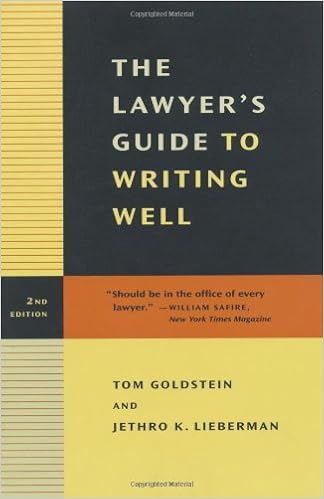 Last year, the Brooklyn Law Library added to its collection The Lawyer’s Guide to Writing Well (3d ed.) by Tom Goldstein and Jethro K. Lieberman (Call No. KF250. G65 2016). This critically acclaimed book “should be in the office of every lawyer” says William Safire of the New York Times. In its 286 pages, the authors demystify legal writing, outline the causes and consequences of poor writing, and prescribe easy-to-apply remedies to improve it. Reflecting changes in law practice over the past decade, this revised edition includes new sections around communicating digitally, getting to the point, and writing persuasively. It also provides an editing checklist, editing exercises with a suggested revision key, usage notes that address common errors, and reference works to further aid your writing. This guide is an invaluable tool for practicing lawyers and law students.
Last year, the Brooklyn Law Library added to its collection The Lawyer’s Guide to Writing Well (3d ed.) by Tom Goldstein and Jethro K. Lieberman (Call No. KF250. G65 2016). This critically acclaimed book “should be in the office of every lawyer” says William Safire of the New York Times. In its 286 pages, the authors demystify legal writing, outline the causes and consequences of poor writing, and prescribe easy-to-apply remedies to improve it. Reflecting changes in law practice over the past decade, this revised edition includes new sections around communicating digitally, getting to the point, and writing persuasively. It also provides an editing checklist, editing exercises with a suggested revision key, usage notes that address common errors, and reference works to further aid your writing. This guide is an invaluable tool for practicing lawyers and law students.
Chapters are: Why Lawyers Write Poorly — Does bad writing really matter? — Don’t make it like it was — The Practice of Writing — Ten steps to writing it down — Of dawdlers and scrawlers, pacers and plungers: getting started and overcoming blocks — The technology of getting it down: from quill pens to computers — Lawyers as publishers: words are your product — Getting to the Point — Writing persuasively for your audience: tell your audience the point — Writing the lead — Revising for Clarity and Luster — Form, structure, and organization — Wrong words, long sentences, and other mister meaners — Revising your prose — Making your writing memorable.
 Books and essays about the art of writing well go back a long time. In 1947, English novelist, essayist, journalist, and critic George Orwell (born Eric Arthur Blair 1903 – 1950) and author of Animal Farm: A Fairy Story and Nineteen Eighty-Four, his most famous works, wrote an essay titled Politics and the English Language. Although the essay addresses the decline of language in political and economic contexts, Orwell, in the closing paragraphs, offers rules that cover effective legal writing as well. They are:
Books and essays about the art of writing well go back a long time. In 1947, English novelist, essayist, journalist, and critic George Orwell (born Eric Arthur Blair 1903 – 1950) and author of Animal Farm: A Fairy Story and Nineteen Eighty-Four, his most famous works, wrote an essay titled Politics and the English Language. Although the essay addresses the decline of language in political and economic contexts, Orwell, in the closing paragraphs, offers rules that cover effective legal writing as well. They are:
- Never use a metaphor, simile, or other figure of speech which you are used to seeing in print.
- Never use a long word where a short one will do.
- If it is possible to cut a word out, always cut it out.
- Never use the passive where you can use the active.
- Never use a foreign phrase, a scientific word, or a jargon word if you can think of an everyday English equivalent.
- Break any of these rules sooner than say anything outright barbarous.
